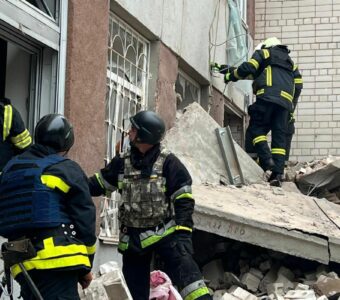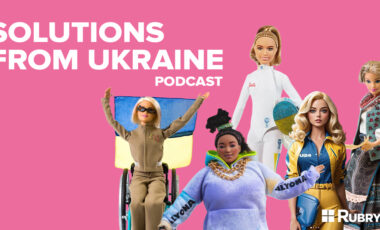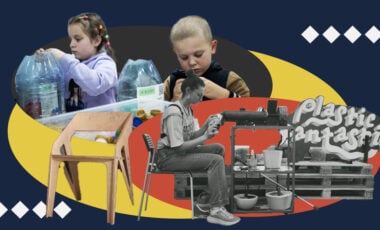"putin won't make me leave home." In Kharkiv’s Northern Saltivka, a group of elderly stays despite intense shelling
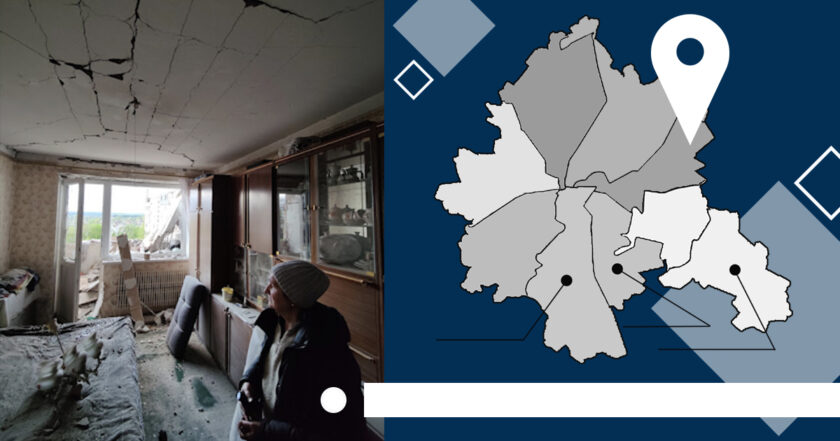
By Cyrille Amoursky
Northern Saltivka, a residential area in Kharkiv, is regularly targeted by russian troops. Most residents left the district, but some people chose to stay. I spent two days with a group of seven people to see how they live under constant missile strikes and why they decided to remain in a ghost town. For security reasons, the exact location of the story is not given.
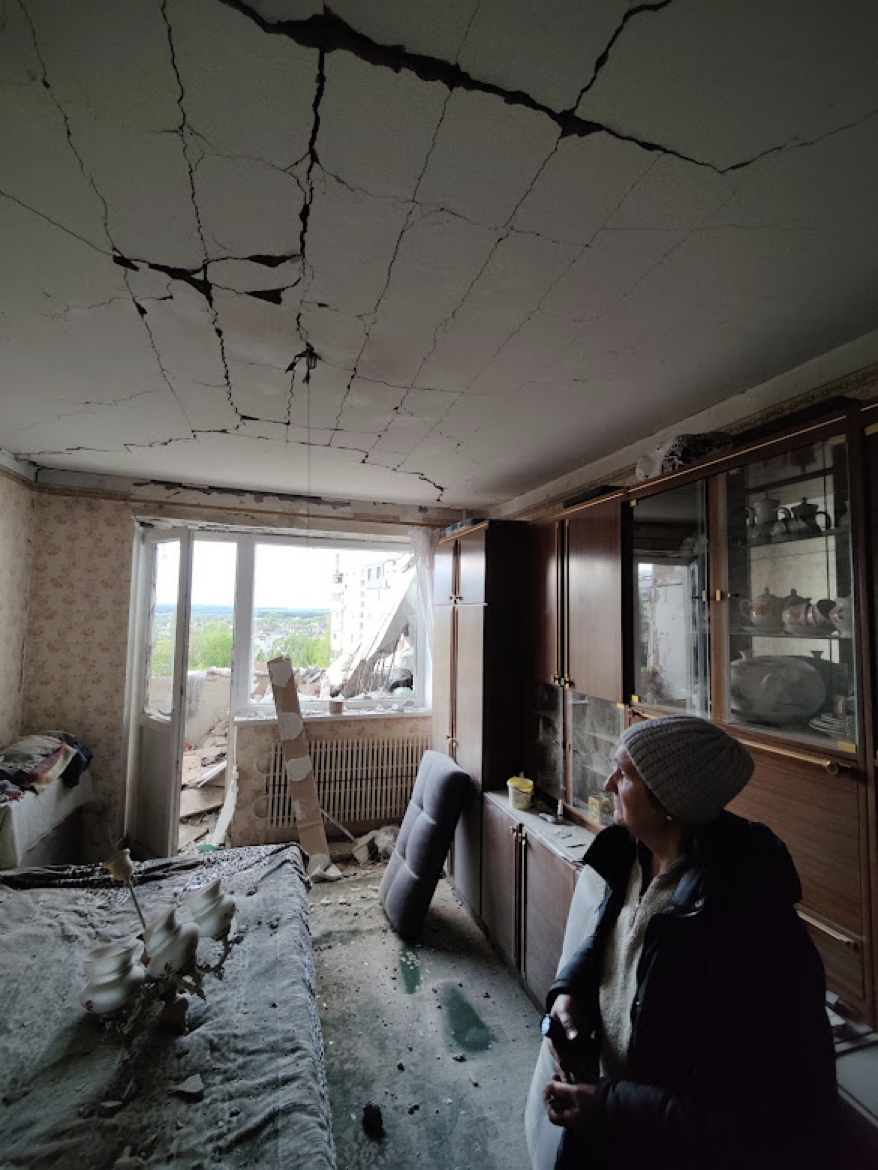
Anna pictured in her destroyed apartment following a missile strike by russian forces, April 30, 2022. (Cyrille Amoursky)
Saltivka used to be the largest residential area in Ukraine. With over 400 thousand inhabitants, the district was home to large marketplaces, parks, and shopping centers. "It was a thriving residential area. With every year, the 'Barabashov' market would grow larger and larger, thus becoming one of the main working places in the city. In winter, we loved sledding. Northern Saltivka was calm and beautiful," Alex, a resident, told me.
Upon crossing the last checkpoint to enter the abandoned neighborhood, I noticed a bombed "Continent" commercial complex, quickly realizing that I wouldn't see the Saltivka that was earlier depicted to me.
Our driver drove us to the center of Northern Saltivka. When we arrived, we saw communication cables in all directions; an entire marketplace burned to ashes, a bombed pharmacy, and dozens of demolished buildings. It was merely impossible to find a single intact window due to the continuous missile raids and the shock waves that followed.
We were met by seven people aged between 60 and 80 years old who decided to stay despite the russian troops constantly targeting the area. It was early in the evening, and the men were cutting wood and boiling water. The women were more eager to answer my questions.
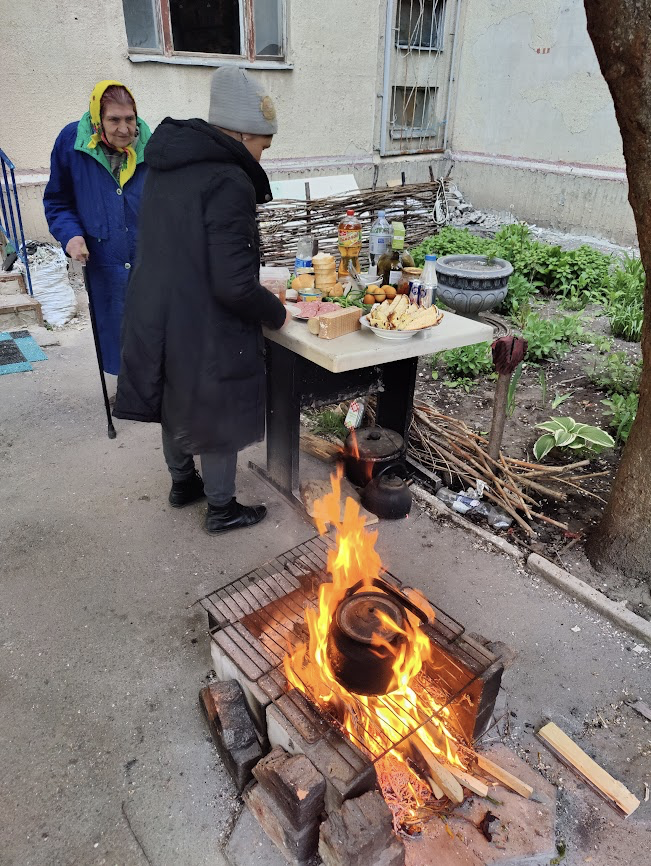
Anna and her mother, Zoya, are cooking breakfast next to a fireplace used to boil water, 30 April 2022. (Cyrille Amoursky)
"We have had no running water, no gas, no electricity, and almost no signal for two months. Volunteers regularly bring us food, medicine, water, and power banks to charge our phones. This is our life," Olha told me, who resided in the building next to her for decades.
After meeting the elderly, we looked around the area to see how much it had been impacted. At the back of the building, two clear holes caused by a missile attack could be seen, with the fourth, fifth, and sixth floors entirely decimated. A burned car was standing next to the back entrance.
"We had a beautiful school, a marketplace, and a peaceful life. russians took all of that away from us," Anna told me, another resident. "I speak both Ukrainian and russian. No one has ever discriminated against me. No one has ever called for the 'russian world' to 'save us.' I am Ukrainian, and I want to achieve peace following a military victory for Ukraine."
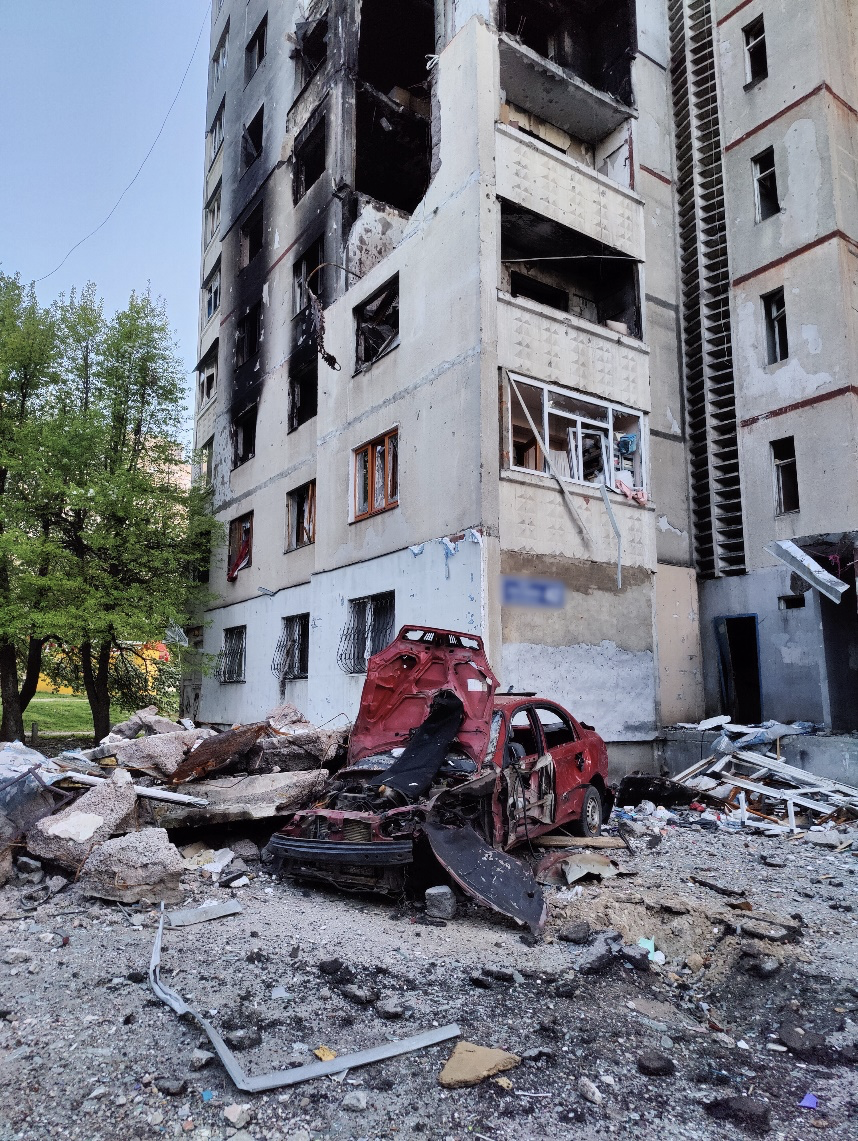
A burned car and a destroyed façade at the back of the building, facing russia's military positions, 28 April 2022. (Cyrille Amoursky)
Anna lives on the seventh floor of her residency. She dwells there with her mother, Zoya, whom she regularly needs to take care of. The cutting off from the electricity made it particularly complicated for her mother to leave the apartment since the elevators were no longer functioning. "It isn't easy, but we go out every day, and we spend most of our time outside. This is our new 'normal,'" she added.
Residents remain calm and optimistic despite the difficulties of living in this dangerous zone. The elderly brought a Paskha (traditional Easter cake in Ukraine) and eggs that they kept for dinner, encouraged us to eat as much as we wanted, and offered us tea and water. "We have enough food and supplies to live. We don't complain, and we appreciate the help volunteers provide," Olha told me during the meal.
Another resident is Zinaida, born in russia but has lived in Ukraine for most of her life. She also identifies herself as Ukrainian and told us multiple times that she predominantly speaks russian and has never faced discrimination for doing so. "We were a very peaceful community. Someone spoke russian, someone spoke Ukrainian, that was never a problem!" she told me, smiling.
Zinaida helps feed those cats and dogs that remain in the area. She showed us a picture of the cats she took care of.
"Life goes on, and we need to protect it. About 40 people decided to remain around our area, and after receiving help from volunteers, we distributed some of it to other residents. Even some children still live here, but their parents do not allow them to go outside," Olha said.
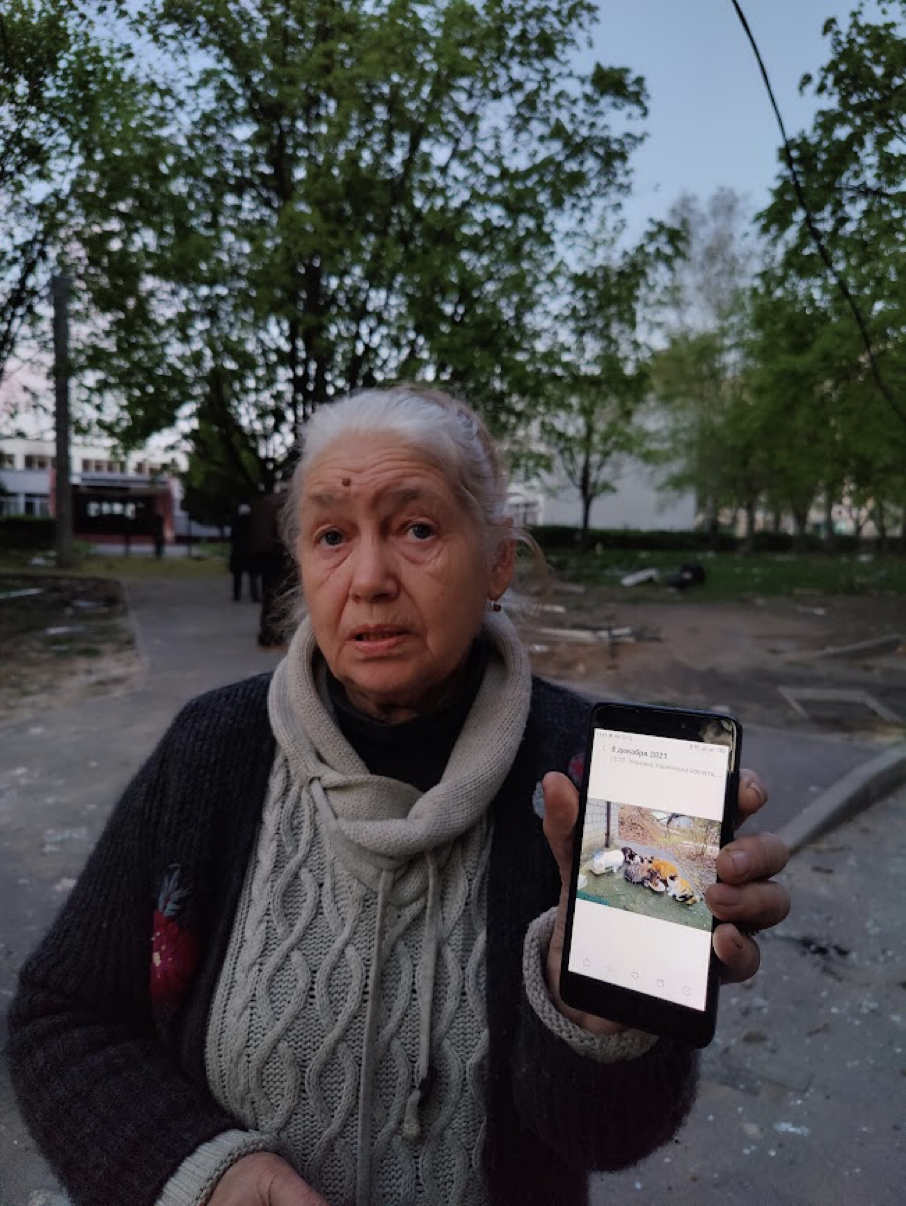
Zinaida showed me the cats that she has been taking care of on her phone, April 28, 2022. (Cyrille Amoursky)
We heard dozens of loud explosions happening somewhere in the city between the moment we arrived and our dinner conversations. As scary as they may have sounded to me, locals are already used to them. When asked how they feel about the continuous bombings, Olga replied, "We don't even notice them anymore."
After the dinner, they all returned to their apartments, even though some of the rooms were destroyed and flooded. Because gas was unavailable and the windows were broken, sleeping in the cold was also an issue. "It's not winter anymore, and it's already better. Back in March, when it was snowing, we had to sleep with our coats on," Anna told me, whose apartment was hit.
We spent the evening sleeping on the first floor with the help of various fabrics and blankets given to us by the residents. Our next day began at five AM sharp after waking up from a loud explosion close to our location.
In the morning, a family arrived by car to pick up some of their belongings after leaving Saltivka following the invasion. "It was too dangerous; we had to leave," a man said. "These women are courageous. They are taking care of our building even through difficult times. I am thankful to them for doing so."
Zinaida told us that there is one remaining location where locals can find drinking water that hasn't been bombed yet. It was about five minutes away, and the scene was similar to the one we saw earlier: floors were missing, the buildings were shelled, and the residency was abandoned.
After we spent some time with Anna, she agreed to show us what her apartment now looks like—something that she initially refused to do. She explained it was too painful to see what her house had been transformed into.
"We live together with my mother in my room. The living room and the balcony have been demolished, and the windows shattered. We normally stay outside because there is not much we can do at home nowadays," Anna told me.
At lunchtime, an elderly man from a neighboring building came over to share a meal. I was later told that a shock wave propelled him after a missile hit his apartment, and he had a concussion following the event. "He comes here to socialize and eat. No one is remaining in his building," Zinaida whispered to me.
For the first time since the group of elderly met him, the man agreed to answer some questions. "This war is an enormous tragedy. russians are killing us, and our young men are dying to protect our homeland. I lived through the Second World War, and now I am living this nightmare again in 2022. I want the war to end, but I want us to be victorious in one united and free Ukraine," he confessed.
The locals agree—peace is necessary, but not at any price. Ukraine has lost too much nowadays to agree on any kind of consensus. If russia was a potential ally for some of them and the Donbas and Crimea situations were 'not that clear,' that is no longer the case.
"I never thought that putin would do such a terrible thing. He completely lost our trust on 24 February. He isn't fighting against some imaginary nazis; he is killing civilians, purposefully so. We are not going anywhere. putin won't make me leave home. I will stay here till the end," Olha said to me.
All the residents agreed: there was no reason to worry about standing in front of the building because it faces the Ukrainian-controlled side.
"We always stay in front of our apartment. We know that our soldiers won't shoot at us. On the backside, however, it is dangerous. All the missiles arrived from there. Without a doubt, it is the russians and them exclusively who target us," Anna revealed to me.
There is a significant change in the mentality of Kharkiv residents. The general narrative was that Ukraine had to find a peaceful solution at any cost, even if it meant renouncing NATO membership, the occupied Donbas, and Crimea. However, that opinion is no longer the dominant one. Kharkiv residents are clear: enough is enough, and following all of the deaths and the destruction that russia has brought upon Ukraine, there is only one possible solution—victory.




